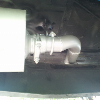Bob Explorer 200
Active Member
- Joined
- October 20, 2010
- Messages
- 53
- Reaction score
- 3
- City, State
- Boston, MA
- Year, Model & Trim Level
- 2002
A little over a month ago, I put a new battery (a heavy duty one sold by Advance Auto) and starter in my 2002 Exp and all went well until a couple of days ago. I had just come back from a couple of local shopping runs and parked it in the driveway but, when I tried to start it a few minutes later, all I got was the typical clicking noise. I disconnected the battery terminals, cleaned them up and reconnected them, checked the connections on the new starter and still it wouldn't start. Using a small electronics multimeter, I got voltage readings of 11.29 before I disconnected the battery and 11.48 once the battery was free of the connectors, which I guess means that the battery is low, right?
Since it started right up three times while I was shopping, I'm guessing that it might be something wrong with the alternator. (Unfortunately, it was such a short neighborhood drive that I didn't bother to check the dash meter at the time.) I'm thinking that the charge left in the battery might have been just enough to start it for three starts and then it failed. I bought a charger today and will charge it tomorrow , but that wont solve my problem. I'm not very good with automotive circuits but I think my next purchase is going to be a decent multimeter to make whatever tests necessary to figure this out. But once the recharge is completed and I start it, shouldn't the dash meter indicate whether it is charging or not? And, if it isn't, wouldn't that indicate that the alternator isn't working?
I'd appreciate any help and suggestions from you guys.
Since it started right up three times while I was shopping, I'm guessing that it might be something wrong with the alternator. (Unfortunately, it was such a short neighborhood drive that I didn't bother to check the dash meter at the time.) I'm thinking that the charge left in the battery might have been just enough to start it for three starts and then it failed. I bought a charger today and will charge it tomorrow , but that wont solve my problem. I'm not very good with automotive circuits but I think my next purchase is going to be a decent multimeter to make whatever tests necessary to figure this out. But once the recharge is completed and I start it, shouldn't the dash meter indicate whether it is charging or not? And, if it isn't, wouldn't that indicate that the alternator isn't working?
I'd appreciate any help and suggestions from you guys.










